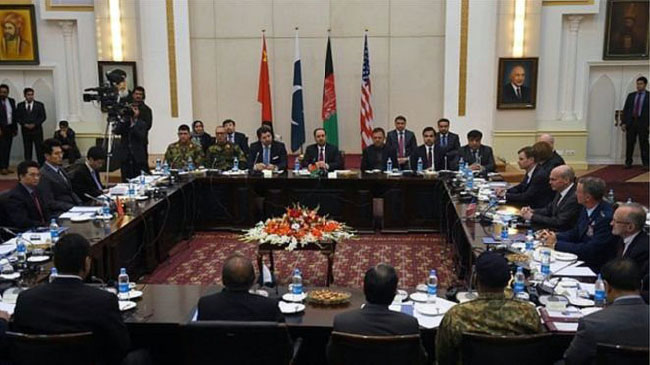Recently, struggles were made at regional and global level for resuming peace process. The sixth round meeting of Quadrilateral Coordination Group (QCG) in Muscat, Shanghai Cooperation Organization (SCO) Contact Group Meeting on Afghanistan in Moscow, and the announcement of a New EU Strategy to promote peace and security in Afghanistan are the latest worldwide steps following the declaration of US strategy about Afghanistan and South Asia. The question is whether the fruit of peace has come to maturity? A logical answer to this question is in need of viewing the objective hotbed of peace and war in the country.
The QCG Meeting:
The sixth round meeting of QCG in Muscat, Oman’s capital, came as the fifth round of talks was held in Islamabad in second month of 1395 (Afghan calendar) and stopped afterward as a result of tension between Afghanistan and Pakistan. The tension emerged as Pakistan did not fulfill its promise. Negotiation is resumed as Pakistan offered following the declaration of US strategy for Afghanistan and its harsh rhetoric against Pakistan for backing terrorist groups. Pakistan has ushered in taking step in this regard so as to reduce international pressure, including the America’s. The trip of Qamar Javed Bajwa, Pakistan’s Chief of Army Staff, to Kabul, the release of Canadian-American Boyle family of five, and the QCG meeting were all pertaining to the issue of peace. Despite the optimism expressed by Afghan officials and High Peace Council (HPC) in terms of recent meeting, which was held in a new international atmosphere following the US strategy, there will not be enough reasons for being optimist. In short, Pakistan was expected to bring the Taliban to negotiating table, but this was not done in the latest round of QCG and no new promise was made by Pakistan.
SCO Contact Group Meeting on Afghanistan:
SCO Contact Group Meeting was hosted by the Russian Federation Ministry of Foreign Affairs on October 11, 2017. The meeting was attended by the SCO member-states at the deputy foreign ministerial level. Afghanistan’s demand for full membership in Shanghai Cooperation Organization, counter terrorism, cooperation of SCO member state in maintaining of security in Afghanistan and expansion of economic cooperation in the region were key issues discussed in the meeting, which was held after the suggestion made by President Vladimir Putin. The SCO Contact Group was established in 2015 with the aim of strengthening ties between Shanghai Cooperation Organization (SCO) and Afghanistan but there was not a palpable result. Russia’s alignment with Pakistan regarding peace talks comes as Russia, according to Times London report, contributed to Taliban through sale of oil – this report has not been confirmed by Afghanistan. Although Russia is concerned about the rise of militancy and terrorism in the Middle East, but its negative reaction to the US strategy reflects its dissatisfaction.
New EU Strategy:
The EU new strategy on Afghanistan, adopted on October 16, 2017 by the ministers of foreign affairs from all 28 EU member states, focuses on four priority areas: promoting peace, stability and regional security, reinforcing democracy, the rule of law and human rights and promoting good governance and women’s empowerment, supporting economic and human development, addressing challenges related to migration. The new Strategy is the latest illustration of the European Union’s strong engagement in and strong commitment to Afghanistan. Notably, it follows the Brussels Conference on Afghanistan, held in October 2016 in Brussels, the signing of a new EU-Afghanistan Cooperation Agreement on Partnership and Development in February 2017, and the appointment of a Special Envoy to Afghanistan in June. Unlike the SCO Contact group and QCG, the EU state members have no direct talks with the Taliban. Hence, Europe is not expected to influence the Taliban but its overall support to Afghan peace process is important.
Field Development:
It is believed that the progress in peace process and the maturity of peace fruit is in need of fundamental changes in the battlefield. Despite the increase of US troops in the country and provision of new military equipment and military services, the Taliban have not been defeated in the battlefields since they have protected their offensive attacks in several provinces. Maruf district in Kandahar has been under threat, explosives are sent to Kabul, and the recent attack on police headquarter left 40 dead and 160 wounded. In another attack in Ghazni province, 30 Afghan security forces were killed and a police station was attacked by hand bombs in the city center. Hence, tangible changes have not occurred in battlefields.
Conclusion:
Home » Opinion » The Outlook on Multi-lateral Struggles About Peace
The Outlook on Multi-lateral Struggles About Peace
| Mohammad Qasim Erfani

